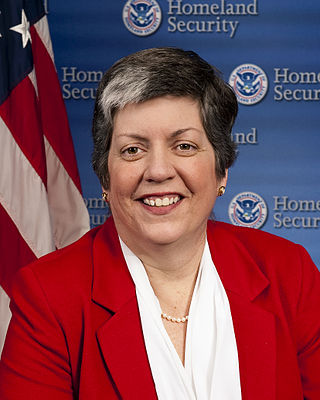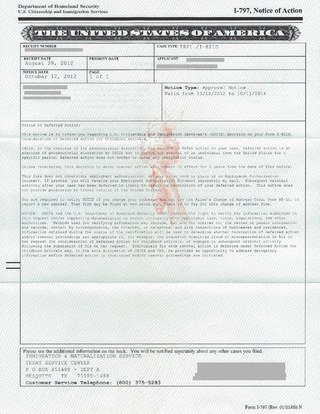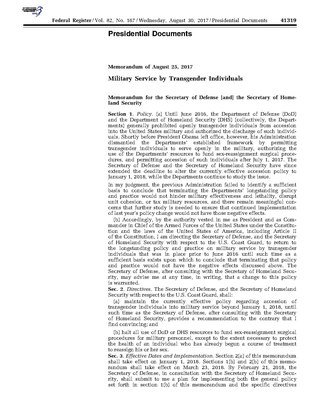
Janet Ann Napolitano is an American politician, lawyer, and university administrator who served as the 21st governor of Arizona from 2003 to 2009 and third United States secretary of homeland security from 2009 to 2013, under President Barack Obama. She was named president of the University of California system in September 2013, and stepped down from that position on August 1, 2020 to join the faculty at the Goldman School of Public Policy. She was elected to the American Philosophical Society in 2018.
Reforming the immigration policy of the United States is a subject of political discourse and contention. Immigration has played an essential part in American history. Some claim that the United States maintains the world's most liberal immigration policy.

The Development, Relief, and Education for Alien Minors Act, known as the DREAM Act, is a United States legislative proposal to grant temporary conditional residency, with the right to work, to illegal immigrants who entered the United States as minors—and, if they later satisfy further qualifications, they would attain permanent residency.

John Deacon Bates is a senior United States district judge of the United States District Court for the District of Columbia. He was appointed by President George W. Bush in December 2001, and has adjudicated several cases directly affecting the office of the President. Bates served as Director of the Administrative Office of the United States Courts, from July 1, 2013 to January 5, 2015, after which he returned to full-time service as a District Judge.

Nicholas George Garaufis is a senior United States district judge of the United States District Court for the Eastern District of New York.

William Haskell Alsup is a senior United States district judge of the United States District Court for the Northern District of California.

Deferred Action for Childhood Arrivals, colloquially referred to as DACA, is a United States immigration policy that allows some individuals with unlawful presence in the United States after being brought to the country as children to receive a renewable two-year period of deferred action from deportation and become eligible for an employment authorization document in the U.S. To be eligible for the program, recipients cannot have felonies or serious misdemeanors on their records. Unlike the proposed DREAM Act, DACA does not provide a path to citizenship for recipients. The policy, an executive branch memorandum, was announced by President Barack Obama on June 15, 2012. This followed a campaign by immigrants, advocates and supporters which employed a range of tactics. U.S. Citizenship and Immigration Services (USCIS) began accepting applications for the program on August 15, 2012.
Deferred Action for Parents of Americans and Lawful Permanent Residents (DAPA), sometimes called Deferred Action for Parental Accountability, was a planned United States immigration policy to grant deferred action status to certain undocumented immigrants who have lived in the United States since 2010 and have children who are either American citizens or lawful permanent residents. It was prevented from going into effect. Deferred action would not be legal status but would come with a three-year renewable work permit and exemption from deportation. DAPA was a presidential executive action, not a law passed by Congress.
United States v. Texas, 579 U.S. ___ (2016), is a United States Supreme Court case regarding the constitutionality of the Deferred Action for Parents of Americans (DAPA) program.

The following is a list of notable lawsuits involving former United States president Donald Trump. The list excludes cases that only name Trump as a legal formality in his capacity as president, such as habeas corpus requests.

Stone v. Trump (1:17-cv-02459-MJG) was a lawsuit filed on August 28, 2017 in the United States District Court for the District of Maryland. The lawsuit alleged that President Donald Trump's ban on transgender personnel joining the U.S. military violated their equal protection and due process rights. The American Civil Liberties Union (ACLU) of Maryland filed the suit on behalf of Petty Officer First Class Brock Stone, an 11-year veteran of the U.S. Navy, and several other transgender service members. In addition to President Trump, the suit named as defendants the Secretaries of Defense, the Army, the Navy, and the Air Force.

The Presidential Memorandum on Military Service by Transgender Individuals, officially the Presidential Memorandum for the Secretary of Defense and the Secretary of Homeland Security, is the 27th presidential memorandum signed by U.S. President Donald Trump on August 25, 2017. The intent was to prevent transgender people from serving in the U.S. military, on the basis that they would be a financial burden due to sex reassignment procedures and associated costs. Federal courts delayed the implementation of this rule by issuing four injunctions. On January 22, 2019, however, the U.S. Supreme Court allowed the Trump administration's ban to take effect.

Jane Doe v. Trump (1:17-cv-01597-CKK) was a lawsuit filed on August 9, 2017, and decided January 4, 2019 in the United States District Court for the District of Columbia. The suit sought to block Donald Trump and top Pentagon officials from implementing the proposed ban on military service for transgender people under the auspices of the equal protection and due process clauses of the Fifth Amendment. The court ruled that the Trump administration's policy should not be blocked. Nonetheless, the Trump administration's policy continued to be blocked due to three preliminary injunctions against it that were not part of this lawsuit and which remained in effect as of the lawsuit's conclusion on January 4, 2019.

Stockman v. Trump (5:17-cv-01799-JGB-KKx) is an old lawsuit filed on September 5, 2017, in the United States District Court for the Central District of California. The suit, like the similar prior suits Jane Doe v. Trump, Stone v. Trump, and Karnoski v. Trump, sought to block Trump and top Pentagon officials from implementing the proposed ban on military service for transgender people under the auspices of the equal protection and due process clauses of the Fifth Amendment. The suit was filed on the behalf of four named and three anonymous transgender plaintiffs by Equality California (EQCA). Two other major LGBT-rights organizations which had filed Jane Doe v. Trump, GLBTQ Legal Advocates & Defenders (GLAD) and the National Center for Lesbian Rights, joined the suit as co-counsels in October 2017.

Department of Homeland Security v. Regents of the University of California, 591 U.S. ___ (2020), was a United States Supreme Court case in which the Court held by a 5–4 vote that a 2017 U.S. Department of Homeland Security (DHS) order to rescind the Deferred Action for Childhood Arrivals (DACA) immigration program was "arbitrary and capricious" under the Administrative Procedure Act (APA) and reversed the order.
Wolf v. Vidal, 591 U.S. ___ (2020), was a case that was filed to challenge the Trump Administration's rescission of Deferred Action for Childhood Arrivals (DACA). Plaintiffs in the case are DACA recipients who argue that the rescission decision is unlawful under the Administrative Procedure Act and the Fifth Amendment. On February 13, 2018, Judge Garaufis in the Eastern District of New York addressed the question of whether the government offered a legally adequate reason for ending the DACA program. The court found that Defendants did not provide a legally adequate reason for ending the DACA program and that the decision to end DACA was arbitrary and capricious. Defendants have appealed the decision to the Second Circuit Court of Appeals.

Beginning in 2019, multiple appointments of acting officials in the United States Department of Homeland Security (DHS) were questioned, on the basis of whether the appointments were legal under the Federal Vacancies Reform Act of 1998 and the Homeland Security Act of 2002. After the departure of Secretary Kirstjen Nielsen in April 2019, the Trump administration did not formally nominate a new secretary to be confirmed by the Senate, relying on acting postings.

The U.S. Citizenship Act of 2021 was a legislative bill that was proposed by President Joe Biden on his first day in office. It was formally introduced in the House by Representative Linda Sánchez. It died with the ending of the 117th Congress.
Cohen Milstein is an American plaintiffs' law firm that engages in large-scale class action litigation. The firm filed a number of lawsuits against Donald Trump during and after his presidency, including a lawsuit which successfully blocked the Trump administration's attempt to roll back the Deferred Action for Childhood Arrivals (DACA) program. Cohen Milstein has made the implementation of corporate diversity, equity, and inclusion (DEI) programs a key part of its litigation strategy. The firm has been hired by various state attorneys general to assist in complex litigation, including by suing ExxonMobil over climate change. Anita Hill was formerly of counsel at Cohen Milstein.
Gene P. Hamilton is an American lawyer and policymaker who served within the U.S. Department of Justice and Department of Homeland Security during the presidency of Donald J. Trump. In these positions, he played key roles in ending the Deferred Action for Childhood Arrivals (DACA) program, creating the Trump administration's "zero tolerance" family separation policy, and in revoking the Temporary Protected Status of immigrants from Sudan and South Sudan.













